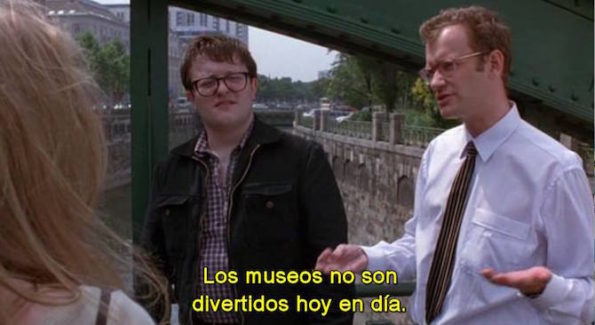Search
To search for an exact match, type the word or phrase you want in quotation marks.
A*DESK has been offering since 2002 contents about criticism and contemporary art. A*DESK has become consolidated thanks to all those who have believed in the project, all those who have followed us, debating, participating and collaborating. Many people have collaborated with A*DESK, and continue to do so. Their efforts, knowledge and belief in the project are what make it grow internationally. At A*DESK we have also generated work for over one hundred professionals in culture, from small collaborations with reviews and classes, to more prolonged and intense collaborations.
At A*DESK we believe in the need for free and universal access to culture and knowledge. We want to carry on being independent, remaining open to more ideas and opinions. If you believe in A*DESK, we need your backing to be able to continue. You can now participate in the project by supporting it. You can choose how much you want to contribute to the project.
You can decide how much you want to bring to the project.

If today we were to rewrite the story of Oblómov, an idle, slothful character from Russian literature, who gave himself up to the “art of doing nothing”, the story would be very different. We would find ourselves obliged to lift him up off the sofa and fill his “dead time” with a frenetic calendar full of exhibitions, performances, concerts, plays, projections of films, lectures, talks, and multiple other events. Moreover we would find ourselves having to put him at the service of a “creative industry”, and what’s more, we’d put him in the predicament of having to have fun at every moment.
In no previous society has there been so much available time as in our own, and yet, inactivity has diminished and all the “gaps” filled. The cultural industry is today tied, on the one hand, to the idea of leisure and the city, and on the other, increasingly in the last few years, to the idea of work and the creative economy. In a somewhat perverse way they are two sides of the same coin: the idea of leisure wouldn’t exist without work and vice versa, there’d be no talk of working if we didn’t enjoy our increasingly scarce “free time”.
The discourse of the market has entered into cultural policy, as in all other spheres of life. There was a time when culture was considered an ambit that differed from other consumer products. Today in contrast it is habitual, and from all sides, to appeal to the value of culture as an economic resource and source of employment, just as there exists a determination to promote creative activities as a business, – the business of the art of earning money -. Culture is therefore no longer an aim in itself, so much as an instrument to reactivate the economy, an appendix to tourism and leisure, and a distinctive of brand cities.
The response to this twist or “turning of the screw ” in the evaluation of culture and knowledge was already forecasted two decades ago by Friedric Jameson in his analysis and coupling of contemporary culture and economy. In the same way, the geographer and social theorist David Harvey (Capital financiero, propiedad inmobiliaria y cultura, 2005) warns about the extent to which culture, and art in particular, are subject to the logic of financial capital that he calls the class-monopoly rent, that benefits from the competitiveness obtained in wagering on distinction and difference.
This imposition of making an economic sector out of culture without bearing in mind it’s social utility has led to total confusion regarding how to manage this common good: either the comfortable “art of shoulder shrugging” is adopted and culture policies are conspicuous for their absence, or else it is delegated to the private sector and subcontractors. So for example, in the Community of Madrid, the responsibility for culture in the last twenty years has been tied to power (the Vice-president and the Government), leisure (Culture and Sports),tourism and employment, (Ministry for Employment, Tourism and Culture), and since the last elections in May is in no man’s land, until they decide which ministry will be left holding the cake.
Cultural institutions and museums have entered in to form part of the leisure and tourism industry and have become integrated into the market through cultural sponsorship of private companies. Free time is the context into which cultural practices are inserted, and the effectiveness of the cultural industry in material terms is often associated with the idea of entertainment and its apparent distraction. We have to enjoy ourselves. This appeal has been adopted by cultural institutions and museums, with the risk this supposes of trivializing, their cultural programme. In this sense, the piece Sacrilege, by the British artist Jeremy Deller is revealing, that was installed a few months ago in the El Soto Park, in Móstoles, as part of the monographic exhibition Centro de Arte Dos de Mayo dedicated to the artist. The work, a life size replica of Stonehenge converted into a blow up bouncy castle, was an invitation to jump around and have fun and a criticism on Deller’s part of the trivialization of art.
The conversion of business into culture is the other side of the coin. Over the last few years initiatives have arisen, supported by town councils and the public administration that endeavour to generate and promote creative industries tied to the idea of business and leisure. One example of this is Zinc Shower, in the Matadero in Madrid, of which the Town council is a co-producer. Zinc Shower is a fair in which companies and entrepreneurs are invited to participate so they can contribute ideas. Software, technology, audio-visuals and education stand out amongst the projects it houses. Another example is Factorial Cultural, also supported by the Matadero in Madrid, which defines itself as a space for the creation and development of business initiatives in different ambits of arts, communication, and new technologies. The Network of Creative Industries through the Fundación Santillana and the IED Madrid, is a platform supporting companies in the cultural and creative industries. In the same way, cultural training centres increasingly on entrepreneurship: such as the postgraduate in Cultural Innovation in Madrid, offered by the Universidad Ramón Llull of Barcelona and Trànsit Projectes, along with Impact Hub Madrid and Hablarenarte. The postgraduate course is “aimed at stimulating entrepreneurial spirit” and directed at those who want to realise an “economically sustainable cultural project”.
Apart from the interest and utility of these types of projects, they all use a specific terminology – cultural entrepreneur, growth, talent, branding, creative economy, innovation, business culture, networking, etc. – which already appropriates the words stemming from a dominant ideology which justify in a certain manner a neoliberal discourse that is increasingly standardardised in the cultural ambit.
If culture can be a business on whom does it have repercussions? For whom should the “cultural companies” work? Can culture produce anything that isn’t for and resulting from the community to which it belongs? It’s not that art and culture can’t generate money, the error is making that it’s ultimate objective. What is at stake is the very consideration of culture as a form of merchandise, as a business or as mere entertainment, and not as something that has a value in itself, symbolic capital that everybody and every community ought to acquire and share, a business belonging to everybody and to nobody.

Rosa Naharro endeavours to think about the present, considering its distinct contexts, through culture and contemporary art. Looking at exhibitions, writing, reading, film, music and even conversations with friends serve as her tools. Understanding and interpreting “something” of what we call the world becomes a self-obligation, as well as taking a certain stance, that doesn´t distance her from it. She combines writing for A*Desk with writing her doctoral thesis at the UCM and working with cultural management projects.
"A desk is a dangerous place from which to watch the world" (John Le Carré)